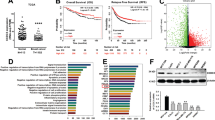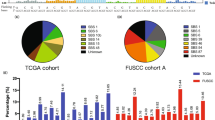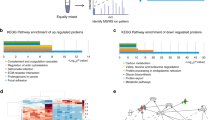Abstract
Using integrative genomics and functional screening, we identified coiled-coil domain containing 68 (CCDC68) as a novel putative tumor suppressor gene (TSG) in pancreatic ductal adenocarcinoma (PDAC). CCDC68 allelic losses were documented in 48% of primary PDAC patient tumors, 50% of PDAC cell lines and 30% of primary patient derived xenografts. We also discovered a single nucleotide polymorphism (SNP) variant (SNP rs1344011) that leads to exon skipping and generation of an unstable protein isoform CCDC68Δ69–114 in 31% of PDAC patients. Overexpression of full length CCDC68 (CCDC68wt) in PANC-1 and Hs.766T PDAC cell lines lacking CDCC68 expression decreased proliferation and tumorigenicity in scid mice. In contrast, the downregulation of endogenous CCDC68 in MIAPaca-2 cells increased tumor growth rate. These effects were not observed with the deletion-containing isoform, CCDC68Δ69–114.
This is a preview of subscription content, access via your institution
Access options
Subscribe to this journal
Receive 50 print issues and online access
$259.00 per year
only $5.18 per issue
Buy this article
- Purchase on Springer Link
- Instant access to full article PDF
Prices may be subject to local taxes which are calculated during checkout






Similar content being viewed by others
References
Jemal A, Bray F, Center MM, Ferlay J, Ward E, Forman D . Global cancer statistics. CA Cancer J Clin 2011; 61: 69–90.
Hruban RH, Maitra A, Goggins M . Update on pancreatic intraepithelial neoplasia. Int J Clin Exp Pathol 2008; 1: 306–316.
Jones S, Zhang X, Parsons DW, Lin JC, Leary RJ, Angenendt P et al. Core signaling pathways in human pancreatic cancers revealed by global genomic analyses. Science 2008; 321: 1801–1806.
Campbell PJ, Yachida S, Mudie LJ, Stephens PJ, Pleasance ED, Stebbings LA et al. The patterns and dynamics of genomic instability in metastatic pancreatic cancer. Nature 2010; 467: 1109–1113.
Yachida S, Jones S, Bozic I, Antal T, Leary R, Fu B et al. Distant metastasis occurs late during the genetic evolution of pancreatic cancer. Nature 2010; 467: 1114–1117.
Qian J, Niu J, Li M, Chiao PJ, Tsao MS . In vitro modeling of human pancreatic duct epithelial cell transformation defines gene expression changes induced by K-ras oncogenic activation in pancreatic carcinogenesis. Cancer Res 2005; 65: 5045–5053.
Thu KL, Radulovich N, Becker-Santos DD, Pikor LA, Pusic A, Lockwood WW et al. SOX15 is a candidate tumor suppressor in pancreatic cancer with a potential role in Wnt/beta-catenin signaling. Oncogene 2013; 33: 279–288.
Bashyam MD, Bair R, Kim YH, Wang P, Hernandez-Boussard T, Karikari CA et al. Array-based comparative genomic hybridization identifies localized DNA amplifications and homozygous deletions in pancreatic cancer. Neoplasia 2005; 7: 556–562.
Nowak NJ, Gaile D, Conroy JM, McQuaid D, Cowell J, Carter R et al. Genome-wide aberrations in pancreatic adenocarcinoma. Cancer Genet Cytogenet 2005; 161: 36–50.
Kimmelman AC, Hezel AF, Aguirre AJ, Zheng H, Paik JH, Ying H et al. Genomic alterations link Rho family of GTPases to the highly invasive phenotype of pancreas cancer. Proc Natl Acad Sci U S A 2008; 105: 19372–19377.
Harada T, Chelala C, Crnogorac-Jurcevic T, Lemoine NR . Genome-wide analysis of pancreatic cancer using microarray-based techniques. Pancreatology 2009; 9: 13–24.
Calhoun ES, Hucl T, Gallmeier E, West KM, Arking DE, Maitra A et al. Identifying allelic loss and homozygous deletions in pancreatic cancer without matched normals using high-density single-nucleotide polymorphism arrays. Cancer Res 2006; 66: 7920–7928.
Harada T, Chelala C, Bhakta V, Chaplin T, Caulee K, Baril P et al. Genome-wide DNA copy number analysis in pancreatic cancer using high-density single nucleotide polymorphism arrays. Oncogene 2008; 27: 1951–1960.
Lefter LP, Furukawa T, Sunamura M, Duda DG, Takeda K, Kotobuki N et al. Suppression of the tumorigenic phenotype by chromosome 18 transfer into pancreatic cancer cell lines. Genes Chromosomes Cancer 2002; 34: 234–242.
Sheffer M, Bacolod MD, Zuk O, Giardina SF, Pincas H, Barany F et al. Association of survival and disease progression with chromosomal instability: a genomic exploration of colorectal cancer. Proc Natl Acad Sci USA 2009; 106: 7131–7136.
Ali Hassan NZ, Mokhtar NM, Kok Sin T, Mohamed Rose I, Sagap I, Harun R et al. Integrated analysis of copy number variation and genome-wide expression profiling in colorectal cancer tissues. PLoS ONE 2014; 9: e92553.
Myhre S, Lingjaerde OC, Hennessy BT, Aure MR, Carey MS, Alsner J et al. Influence of DNA copy number and mRNA levels on the expression of breast cancer related proteins. Mol Oncol 2013; 7: 704–718.
Sharrard RM, Maitland NJ . Alternative splicing of the human PTEN/MMAC1/TEP1 gene. Biochim Biophys Acta 2000; 1494: 282–285.
Hofstetter G, Berger A, Fiegl H, Slade N, Zoric A, Holzer B et al. Alternative splicing of p53 and p73: the novel p53 splice variant p53delta is an independent prognostic marker in ovarian cancer. Oncogene 2010; 29: 1997–2004.
Tammaro C, Raponi M, Wilson DI, Baralle D . BRCA1 exon 11 alternative splicing, multiple functions and the association with cancer. Biochem Soc Trans 2012; 40: 768–772.
Eichmuller S, Usener D, Dummer R, Stein A, Thiel D, Schadendorf D . Serological detection of cutaneous T-cell lymphoma-associated antigens. Proc Natl Acad Sci USA 2001; 98: 629–634.
Devitt G, Meyer C, Wiedemann N, Eichmuller S, Kopp-Schneider A, Haferkamp A et al. Serological analysis of human renal cell carcinoma. Int J Cancer 2006; 118: 2210–2219.
Gerhardt A, Usener D, Keese M, Sturm J, Schadendorf D, Eichmuller S . Tissue expression and sero-reactivity of tumor-specific antigens in colorectal cancer. Cancer Lett 2004; 208: 197–206.
Furukawa T, Duguid WP, Rosenberg L, Viallet J, Galloway DA, Tsao MS . Long-term culture and immortalization of epithelial cells from normal adult human pancreatic ducts transfected by the E6E7 gene of human papilloma virus 16. Am J Pathol 1996; 148: 1763–1770.
Lockwood WW, Chari R, Chi B, Lam WL . Recent advances in array comparative genomic hybridization technologies and their applications in human genetics. Eur J Hum Genet 2006; 14: 139–148.
Leung L, Radulovich N, Zhu CQ, Wang D, To C, Ibrahimov E et al. Loss of Canonical Smad4 Signaling Promotes KRAS Driven Malignant Transformation of Human Pancreatic Duct Epithelial Cells and Metastasis. PLoS ONE 2013; 8: e84366.
Hirsch FR, Varella-Garcia M, Bunn PA Jr, Di Maria MV, Veve R, Bremmes RM et al. Epidermal growth factor receptor in non-small-cell lung carcinomas: correlation between gene copy number and protein expression and impact on prognosis. J Clin Oncol 2003; 21: 3798–3807.
Mak AB, Ni Z, Hewel JA, Chen GI, Zhong G, Karamboulas K et al. A lentiviral functional proteomics approach identifies chromatin remodeling complexes important for the induction of pluripotency. Mol Cell Proteomics 2010; 9: 811–823.
Radulovich N, Leung L, Tsao MS . Modified gateway system for double shRNA expression and Cre/lox based gene expression. BMC Biotechnol 2011; 11: 24.
Don RH, Cox PT, Wainwright BJ, Baker K, Mattick JS . 'Touchdown' PCR to circumvent spurious priming during gene amplification. Nucleic Acids Res 1991; 19: 4008.
Radulovich N, Pham NA, Strumpf D, Leung L, Xie W, Jurisica I et al. Differential roles of cyclin D1 and D3 in pancreatic ductal adenocarcinoma. Mol Cancer 2010; 9: 24.
Navab R, Liu J, Seiden-Long I, Shih W, Li M, Bandarchi B et al. Co-overexpression of Met and hepatocyte growth factor promotes systemic metastasis in NCI-H460 non-small cell lung carcinoma cells. Neoplasia 2009; 11: 1292–1300.
Thorvaldsdottir H, Robinson JT, Mesirov JP . Integrative Genomics Viewer (IGV): high-performance genomics data visualization and exploration. Brief Bioinform 2013; 14: 178–192.
Ouyang H, Mou L, Luk C, Liu N, Karaskova J, Squire J et al. Immortal human pancreatic duct epithelial cell lines with near normal genotype and phenotype. Am J Pathol 2000; 157: 1623–1631.
Acknowledgements
We thank the following people for assistance: James Ho (immunohistochemistry), Olga Ludkovksy (FISH), Ni Liu (PCR) and Dennis Wang (support in ICGC analysis). This study was supported by the Canadian Cancer Society Research Institute grant#700809, Canadian Institutes of Health Research grant MOP-49585 and the Ontario Ministry of Health and Long Term Care. N. Radulovich and K. Thu are Vanier Canada Graduate Scholars. Dr S. Sakashita is supported by the Terry Fox Foundation STIHR Program in Molecular Pathology of Cancer at CIHR (STP 53912). Dr Tsao is the M. Qasim Choksi Chair in Lung Cancer Translational Research.
Author information
Authors and Affiliations
Corresponding author
Ethics declarations
Competing interests
The authors declare no conflict of interest.
Additional information
Supplementary Information accompanies this paper on the Oncogene website
Supplementary information
Rights and permissions
About this article
Cite this article
Radulovich, N., Leung, L., Ibrahimov, E. et al. Coiled-coil domain containing 68 (CCDC68) demonstrates a tumor-suppressive role in pancreatic ductal adenocarcinoma. Oncogene 34, 4238–4247 (2015). https://doi.org/10.1038/onc.2014.357
Received:
Revised:
Accepted:
Published:
Issue Date:
DOI: https://doi.org/10.1038/onc.2014.357
This article is cited by
-
Rho guanine nucleotide exchange factor ARHGEF10 is a putative tumor suppressor in pancreatic ductal adenocarcinoma
Oncogene (2020)
-
Overexpression of CCDC69 activates p14ARF/MDM2/p53 pathway and confers cisplatin sensitivity
Journal of Ovarian Research (2019)
-
Hierarchical assembly of centriole subdistal appendages via centrosome binding proteins CCDC120 and CCDC68
Nature Communications (2017)



